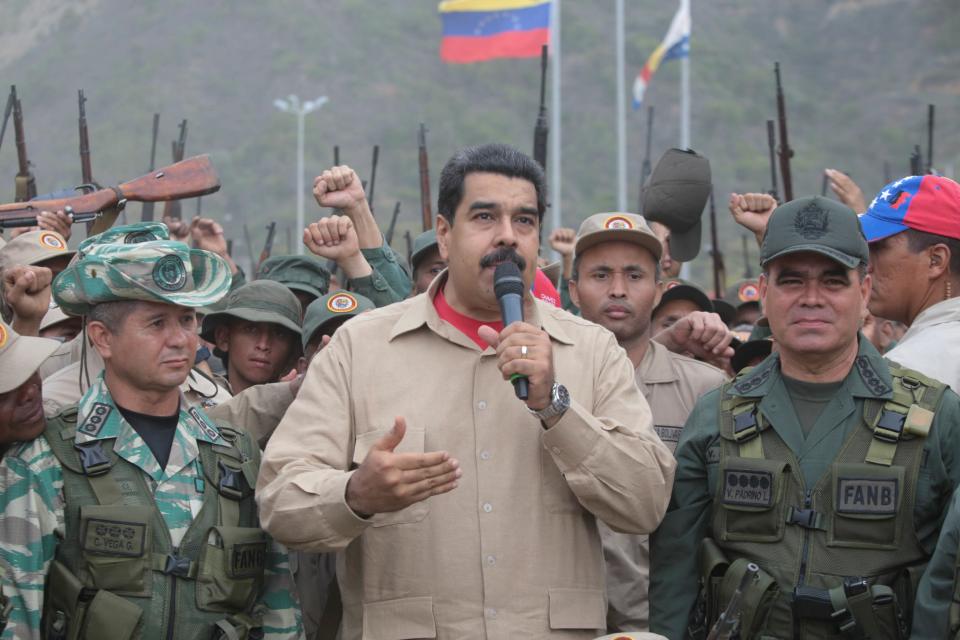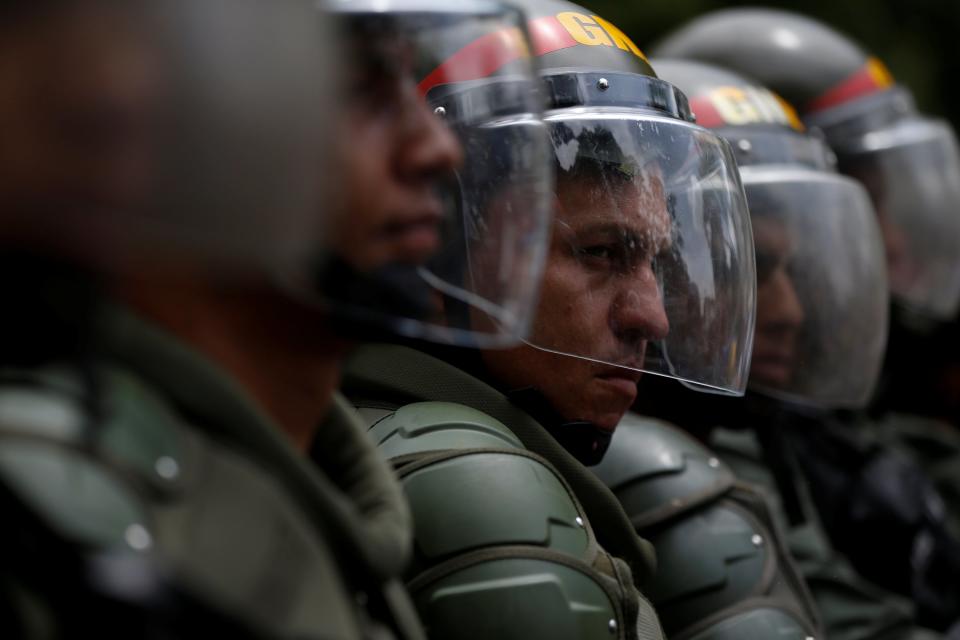How the military could play 'king-maker' in Venezuela's political crisis

Miraflores Palace/Handout via REUTERS
Just days after antigovernment protesters clashed with police in multiple cities, Venezuela's military took part in a two-day exercise that was the largest such military drill in the country's history.
The drills come not long after President Nicolas Maduro declared a state of emergency, granting himself and security forces broader power to deal with public unrest and economic distress.
Maduro's emphasis on the military's role in quelling the country's turmoil, and opposition members' comments on the same, may indicate that Venezuela's armed forces could soon be forced to pick a side in the country's ongoing political strife.
As tensions in Venezuela intensified in recent weeks — social unrest driven largely by deep economic distortions and the contentious political environment — the military and other security forces have been thrust into a more prominent role.
"Venezuela is threatened," Defense Minister Vladimir Padrino Lopez said of the military exercises on state television on Thursday, according to Bloomberg.
"This is the first time we are carrying out an exercise of this nature in the country," Padrino added. "In terms of national reach, it's going to be in every strategic region."

Miraflores Palace/Handout via REUTERS
Maduro has denounced domestic "coup-plotters" and external interference, primarily from the US, which he says sent spy planes into the country's airspace illegally this month. The Venezuelan president has also posed the military as a bulwark in his government's fight against foreign interference.
"From the empire, they dream of dividing our armed forces ... fragmenting them, weakening them," Maduro said of the US, according to Reuters.
Domestically, the military was heavily involved in a new phase of Operation Liberation and Protection of the People, which was meant to crack down on crime but said by some to be an effort to reassert political control.

Miraflores Palace/Handout via REUTERS
The opposition, too, has called on the military to take a stand.
Henrique Capriles, an opposition leader and governor of Miranda state, said on May 18 that Maduro was "putting himself above the constitution" by issuing the emergency decree.
"And I tell the armed forces: The hour of truth is coming, to decide whether you are with the constitution or with Maduro," Capriles said, according to the BBC.
Capriles stressed that he was not calling for a coup, but a "legal and constitutional way of ousting" Maduro.
The military 'king-maker'
A half-million soldiers and militia members took part in the exercises over the weekend, which, according to AFP, were meant to show that the armed forces could deal with internal or external conflict.
RAW Embed
The exercises, along with Maduro's and Capriles' pronouncements, have cast more attention on the political leanings of Venezuela's military and its leadership.
Capriles' statement could be in recognition of the military's longstanding role as "king-maker," Juan Nagel, a Venezuelan economist in Chile and coauthor of Caracas Chronicles, a website critical of the government, told The Christian Science Monitor.
"Obviously what is happening here is the opposition is sensing that the possibility of democratic engagement with the government is waning," Nagel said, adding that Capriles' comments — which seemed driven by "desperation and exasperation" — appeared to try to strike a balance between asking the military to pressure the government and to intervene directly.
But it's unclear how receptive the military — its leadership in particular — will be to efforts to force Maduro out or to change the political status quo.

Miraflores Palace/Handout via REUTERS
On one hand, the military is largely believed to be aligned with Maduro's socialist party, having been "systematically purged" of opposing voices over the last 20 years, Cynthia Arnson, director of the Wilson Center's Latin America Program, told The Christian Science Monitor.
At the same time, military officials have taken on powerful roles in the current government. One-third of the country's 28 ministers and half of the state governors are active or retired military.
"The military has hijacked Maduro and he has hijacked the military," Venezuelan history professor Margarita López Maya said in an interview earlier this month.
Moreover, this outsize role has given soldiers and officers opportunities to profit from illicit activities, ranging from kidnapping to smuggling gasoline. A political transition raises the possibility that the military will lose that power or face punishment for those abuses — something that is no doubt very unappealing.
But the military is not a monolith, and Venezuela's ongoing turmoil could lead some of the armed forces to reconsider their political alignment.

Miraflores Palace/Handout via REUTERS
"At this point, it appears that at least a significant segment of the armed forces, including retired and middle-ranking officers, may support a transition," intelligence firm Stratfor wrote in February. López Maya made the same point, saying that military officers not connected to corruption networks felt the same hardships as protestors in the street.
"I don't think the opposition would have made this comment if there wasn't a section of the military willing to stand up for the Constitution and oppose the slide into authoritarianism," Arnson said, referring to Capriles' statement.
Such a split within the military would not be unprecedented. In 1992, motivated in part by orders to fire on protesting civilians, some military officers launched a coup that ultimately failed. They were led by Hugo Chavez, who would serve some jail time before being elected president in 1998.
See Also:

 Yahoo Finance
Yahoo Finance 
